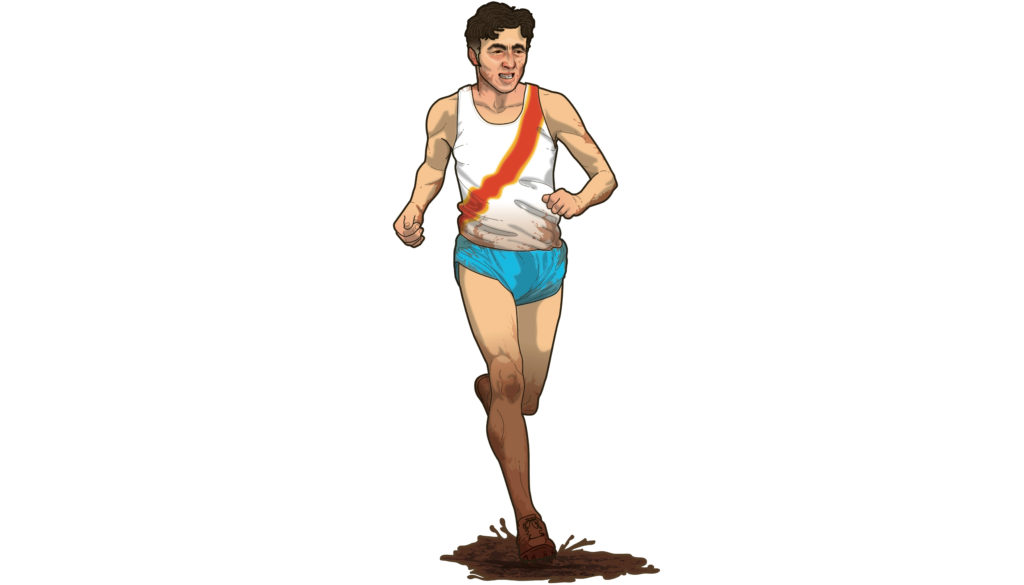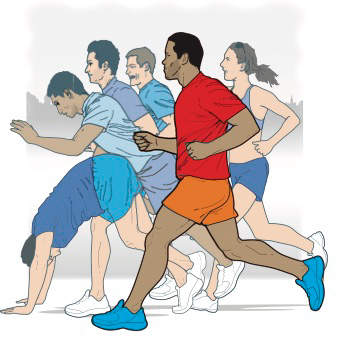in the YES corner
Dr Costas Karagheorgis is an expert in sports psychology and the author of Applying Music in Exercise and Sport (Human Kinetics Publishers, 2016).
What’s the advantage of running to music?
One of the main benefits is that it reduces perceived exertion – often by about 10% – and enhances mood. That holds true for low- and moderate-intensity running. At high-intensity running, music has no effect in terms of lowering perceived exertion, but it does still elevate mood at high intensities.
Does running become boring without some external stimulus?
For some people, particularly those who have a dissociative attention style – in other words, those with a tendency to focus outwards – music can be a welcome distraction from the onerous nature of running. It can relieve boredom, distract the mind from the fatigue-related symptoms of the run, and make the whole experience more immersive and pleasurable.
Is running becoming too gadget-dependent?
Possibly, yes. There’s a freedom associated with running, wherein it puts you in touch with the functionality of your body. Using gadgetry can detract from that. But for people who are finding it hard to engage in a habitual physical activity programme, gadgetry can be a great motivational tool.
Are there any scenarios in which you’d discourage people from running to music?
I would strongly dissuade people from using a personal music device on pavements and roads, as well as in parks at night. It’s extremely dangerous. Music is such an effective stimulant that it can become intoxicating, and thus it causes you to miss important cues in your environment, such as somebody shouting at you or somebody beeping their car horn. If you go to your local park in the daytime or run on a treadmill, that’s fine.
in the NO corner
Jonny Muir is a runner and author. He’s currently working on a book about Scottish hill running – heightsofmadness.co.uk
What’s the advantage of running without music?
I want to connect with the world around me. With much of my running taking place in the Pentland Hills near Edinburgh, that means connecting with nature: the call of birds, the heave of the wind, the crunch of scree.
Does running become boring without some external stimulus?
I used to live in Cheltenham and on my walk to work each morning I passed a wall of graffiti emblazoned with the words: ‘Only boring people get bored.’ I also like Einstein’s assertion that ‘imagination is more important than intelligence’. Do I need to elaborate further?
Is running becoming too gadget-dependent?
As a society, we are dependent on technology; running merely reflects society. When I noticed my GPS watch had failed to record the first mile of a recent commute from work to home, I panicked. Like many others, I have fallen into the trap of recording every inch of my movements. The addiction forms part of our need to over-share. When I asked a world champion mountain runner about the distractions of social media, she said: “I care about what I’m doing. I don’t care about others.” And that’s probably why she became a world champion.
Do those who run in headphones risk missing out on the race-day atmosphere of events like the London Marathon?
Experiences are gained through the senses. If you dull one of them, the experience is inevitably impaired. What I remember most about my five London Marathon races is sound: the wall of noise around Tower Bridge, the ringing echo of the tunnels, the rhythm of your feet striking road. Those are part of the package that make a London Marathon place a golden ticket; remove these elements and you may as well run a marathon anywhere.







